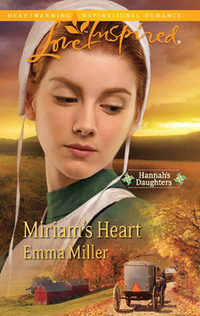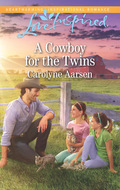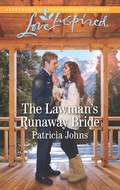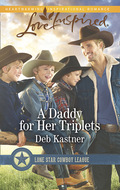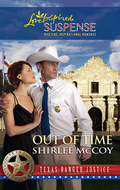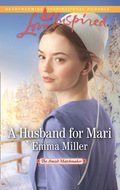Kitap dosya olarak indirilemez ancak uygulamamız üzerinden veya online olarak web sitemizden okunabilir.
Kitabı oku: «Miriam's Heart»
“I’m coming up,” Miriam said.
Charley offered his hand when she reached the top rung of the ladder. She took it and climbed up into the shadowy loft. Charley squeezed her fingers in his and she suddenly realized he was still holding her hand, or she was holding his; she wasn’t quite sure which it was.
She quickly tucked her hand behind her back and averted her gaze, as a small thrill of excitement passed through her.
“Miriam,” he began.
She backed toward the ladder. “I j-just wanted to see the hay,” she stammered, feeling all off-kilter. She didn’t know why, but she felt as if she needed to get away from Charley, as if she needed to catch her breath. “I’ve got things to do.”
Charley followed her down. Miriam felt her cheeks grow warm. She felt completely flustered and didn’t know why. She’d held Charley’s hand plenty of times before. What made this time different?
Charley was looking at Miriam strangely.
Something had changed between them in those few seconds up in the hayloft and Miriam wasn’t sure what.
EMMA MILLER
lives quietly in her old farmhouse in rural Delaware amid fertile fields and lush woodlands. Fortunate enough to be born into a family of strong faith, she grew up on a dairy farm, surrounded by loving parents, siblings, grandparents, aunts, uncles and cousins. Emma was educated in local schools, and once taught in an Amish schoolhouse much like the one at Seven Poplars. When she’s not caring for her large family, reading and writing are her favorite pastimes.
Miriam’s Heart
Emma Miller

MILLS & BOON
Before you start reading, why not sign up?
Thank you for downloading this Mills & Boon book. If you want to hear about exclusive discounts, special offers and competitions, sign up to our email newsletter today!
Or simply visit
Mills & Boon emails are completely free to receive and you can unsubscribe at any time via the link in any email we send you.
Love comes from a pure heart and a
good conscience and a sincere faith.
—1 Timothy 1:5
For the lost Prince of Persia
and the blessings he has brought to our family
Contents
Chapter One
Chapter Two
Chapter Three
Chapter Four
Chapter Five
Chapter Six
Chapter Seven
Chapter Eight
Chapter Nine
Chapter Ten
Chapter Eleven
Chapter Twelve
Chapter Thirteen
Chapter Fourteen
Chapter Fifteen
Chapter Sixteen
Chapter Seventeen
Epilogue
Letter to Reader
Questions for Discussion
Chapter One
Kent County, Delaware—Early Autumn
“Whoa, easy, Blackie!” Miriam cried as the black horse slipped and nearly fell. The iron-wheeled wagon swayed ominously. Blackie’s teammate, Molly, stood patiently until the gelding recovered his footing.
Miriam let out a sigh of relief as her racing pulse returned to normal. She’d been driving teams since she was six, but Blackie was young and had a lot to learn. Gripping the leathers firmly in her small hands, Miriam guided the horses along the muddy farm lane that ran between her family’s orchard and the creek. The bank on her right was steep, the water higher than normal due to heavy rain earlier in the week.
“Not far now,” she soothed. Thank the Lord for Molly. The dapple-gray mare might have been past her prime, but she could always be counted on to do her job without any fuss. The wagon was piled high with bales of hay, and Miriam didn’t want to lose any off the back.
Haying was one of the few tasks the Yoder girls and their mother hadn’t done on their farm since Dat’s death two years ago. Instead, they traded the use of pasture land with Uncle Reuben for his extra hay. He paid an English farmer to cut and bale the timothy and clover. All Miriam had to do was haul the sweet-smelling bales home. Today, she was in a hurry. The sky suggested there was more rain coming out of the west and she had to get the hay stacked in the barn before the skies opened up. Not that she minded. In fact, she liked this kind of work: the steady clip-clop of the horses’ hooves, the smell of the timothy, the feel of the reins in her hands.
If Mam and Dat had had sons instead of seven daughters, Miriam supposed she’d have been confined to working in the house and garden like most Amish girls. But she’d always been different, the girl people called a tomboy, and she preferred outside chores. Despite her modest dress and Amish kapp, Miriam loved being in the fields in any weather and had a real knack with livestock. It might have been sinful pride, but when it came to farming, she secretly considered herself a match for any young man in the county.
It had been her father who’d taught her all she knew about planting and harvesting and rotating the crops. Her earliest memory was of riding on his wide shoulders as he drove the cows into the barn for milking. Since his death, she’d tried to fill his shoes, but his absence had left a great hole in their family and in her heart.
Miriam’s mother had taken over the teaching position at the Seven Poplars Amish school and all of Miriam’s unmarried sisters pitched in on the farm. It wasn’t easy, but they managed to keep the large homestead going, tending the animals, planting and harvesting crops and helping the less fortunate. All too soon, Miriam knew it would be harder. With Ruth marrying in November and going to live in the new house she and Eli were building on the far end of the property, there would be one less pair of hands to help.
Blackie’s startled snort and laid back ears yanked Miriam from her daydreaming. “Easy, boy. What’s wrong?” She quickly scanned the lane she’d been following that ran along a small creek. There wasn’t anything to frighten him, nothing but a weathered black stick lying between the wagon ruts.
But the gelding didn’t settle down. Instead, he stiffened, let out a shrill whinny and reared up in the traces, as the muddy branch came alive, raised its head, hissed threateningly and slithered directly toward Blackie.
Snake! Miriam shuddered as she came to her feet and fought to gain control of the terrified horses. She hated snakes. And this black snake was huge.
Blackie reared again, pawed the air and threw himself sideways, crashing into the mare and sending both animals and the hay wagon tumbling off the road and down the bank. A wagon wheel cracked and Miriam jumped free before she was caught in the tangle of thrashing horses, leather harnesses, wood and hay bales.
She landed in the road, nearly on top of the snake. Both horses were whinnying frantically, but for long seconds, Miriam lay sprawled in the mud, the wind knocked out of her. The black snake slithered across her wrist, making its escape and she squealed with disgust, and rolled away from it. Vaguely, she heard someone shouting her name, but all she could think of was her horses.
Charley Byler was halfway across the field from the Yoders’ barn when he saw the black horse rear up in its traces. He dropped his lunch pail and broke into a run as the team and wagon toppled off the side of the lane into the creek.
He was a fast runner. He usually won the races at community picnics and frolics, but he wasn’t fast enough to reach Miriam before she’d climbed up off the road and disappeared over the stream bank. “Ne!” he shouted. “Miriam, don’t!”
But she didn’t listen. Miriam—his dear Miriam—never listened to anything he said. Heart in his throat, Charley’s feet pounded the grass until, breathless, he reached the lane and half slid, half fell into the creek beside her. “Miriam!” He caught her shoulders and pulled her back from the kicking, flailing animals.
“Let me go! I have to—”
He caught her around the waist, surprised by how strong she was, especially for such a little thing. “Listen to me,” he pleaded. He knew how valuable the team was and how attached Miriam was to them, but he also knew how dangerous a frightened horse could be. His own brother had been killed by a yearling colt’s hoof when the boy was only eight years old. “Miriam, you can’t do it this way!”
Blackie, still kicking, had fallen on top of Molly. The mare’s eyes rolled back in her head so that only the whites showed. She thrashed and neighed pitifully in the muck, blood seeping from her neck and hindquarters to tint the creek water a sickening pink.
“You have to help me,” Miriam insisted. “Blackie will—”
At that instant, Charley’s boot slipped on the muddy bottom and they both went down into the waist-deep water.
To Charley’s surprise, Miriam—who never cried—burst into tears. He was helping her to her feet, when he heard the frantic barking of a dog. Irwin and his terrier appeared at the edge of the road.
“You all right?” Thirteen-year-old Irwin Beachy wasn’t family, but he acted like it since he’d come to live with the Yoders. He was home from school today, supposedly with a sore throat, but he was known to fib to get out of school. “What can I do?”
“I’m not hurt,” Miriam answered, between sobs. “Run quick…to the chair shop. Use the phone to…to call Hartman’s. Tell them…tell them it’s an emergency. We need a vet right away.”
Miriam started to shiver. Her purple dress and white apron were soaked through, her kapp gone. Charley thought Miriam would be better off out of the water, but he knew better than to suggest it. She’d not leave these animals until they were out of the creek.
“You want me to climb down there?” Irwin asked. “Maybe we could unhook the—”
“We might do more harm than good.” Charley looked down at the horses; they were quieter now, wide-eyed with fear, but not struggling. “I’d rather have one of the Hartmans here before we try that.”
“The phone, Irwin!” Miriam cried. “Call the Hartmans.”
“Ask for Albert, if you can,” Charley called after the boy as he took off with the dog on his heels. “We need someone with experience.”
“Get whoever can come the fastest!” Miriam pulled loose from Charley and waded toward the horses. “Shh, shh,” she murmured. “Easy, now.”
The dapple-gray mare lay still, her head held at an awkward angle out of the water. Charley hoped that the old girl didn’t have a broken leg. The first time he’d ever used a cultivator was behind that mare. Miriam’s father had showed him how and he’d always been grateful to Jonas and to Molly for the lesson. Since Miriam seemed to be calming Blackie, Charley knelt down and supported the mare’s head.
Blood continued to seep from a long scrape on the horse’s neck. Charley supposed the wound would need sewing up, but it didn’t look like something that was fatal. Her hind legs were what worried him. If a bone was shattered, it would be the end of the road for the mare. Miriam was a wonder with horses, with most any animal really, but she couldn’t heal a broken bone in a horse’s leg. Some people tried that with expensive racehorses, but like all Amish, the Yoders didn’t carry insurance on their animals, or on anything else. Sending an old horse off to some fancy veterinary hospital was beyond what Miriam’s Mam or the church could afford. When horses in Seven Poplars broke a leg, they had to be put down.
Charley stroked the dapple-gray’s head. He felt so sorry for her, but he didn’t dare to try and get the horses out of the creek until he had more help. If one of them didn’t have broken bones yet, the fright of getting them free might cause it.
Charley glanced at Miriam. One of her red-gold braids had come unpinned and hung over her shoulder. He swallowed hard. He knew he shouldn’t be staring at her hair. That was for a husband to see in the privacy of their home. But he couldn’t look away. It was so beautiful in the sunlight, and the little curling hairs at the back of her neck gleamed with drops of creek water.
A warmth curled in his stomach and seeped up to make his chest so tight that it was hard to breathe. He’d known Miriam Yoder since they were both in leading strings. They’d napped together on a blanket in a corner of his mother’s garden, as babies. Then, when they’d gotten older, maybe three or four, they’d played on her porch, swinging on the bench swing and taking all the animals out of a Noah’s Ark her Dat had carved for her and lining them up, two by two.
He guessed that he’d loved Miriam as long as he could remember, but she’d been just Miriam, like one of his sisters, only tougher. Last spring, he’d bought her pie at the school fundraiser and they’d shared many a picnic lunch. He’d always liked Miriam and he’d never cared that she was different from most girls, never cared that she could pitch a baseball better than him or catch more fish in the pond. He’d teased her, ridden with her to group sings and played clapping games at the young people’s doings.
Miriam was as familiar to him as his own mother, but standing here in the creek without her kapp, her dress soaked and muddy, scowling at him, he felt like he didn’t know her at all. He could have told any of his pals that he loved Miriam Yoder, but he hadn’t realized what that meant…until this moment. Suddenly, the thought that she could have been hurt when the wagon turned over, that she could have been tangled in the lines and pulled under, or crushed by the horses, brought tears to his eyes.
“Miriam,” he said. His mouth felt dry. His tongue stuck to the roof of his mouth.
“Yes?” She turned those intense gray eyes from the horse back to him.
He suddenly felt foolish. He didn’t know what he was saying. He couldn’t tell her how he felt. They hadn’t ridden home from a frolic together more than three or four times. They hadn’t walked out together and she hadn’t invited him in when they’d gotten to her house and everyone else was asleep. They’d been friends, chums; they ran around with the same gang. He couldn’t just blurt out that he suddenly realized that he loved her. “Nothing. Never mind.”
She returned her attention to Blackie. “Shh, easy, easy,” she said, laying her cheek against his nose. “He’s quieting down. He can’t be hurt bad, don’t you think? But where’s all that blood coming from?” She leaned forward to touch the gelding’s right shoulder, and the animal squealed and started struggling against the harness again.
“Leave it,” Charley ordered, clamping a hand on her arm. “Wait for the vet. You could get hurt.”
“Ne,” she argued, but it wasn’t a real protest. She didn’t struggle against his grip. She knew he was right.
He nodded. “Just keep doing what you were.” He held her arm a second longer than he needed to.
“Miriam!”
It was a woman’s voice, one of her sisters’, for sure. Charley released Miriam.
“Oh, Anna, come quick! Oh, it’s terrible.”
Charley glanced up. It was Miriam’s twin, a big girl, more than a head taller and three times as wide. No one could ever accuse Anna of not being Plain. She wasn’t ugly; she had nice eyes, but she couldn’t hold a candle to Miriam. Still, he liked Anna well enough. She had a good heart and she baked the best biscuits in Kent County, maybe the whole state.
“Don’t cry, Anna,” Miriam said. “You’ll set me to crying again.”
“How bad are they hurt?” Miriam’s older sister Ruth came to stand on the bank beside Anna. She was holding Miriam’s filthy white kapp. “Are you all right? Is she all right?” She glanced from Miriam to Charley.
“I’m fine,” Miriam assured her. “Just muddy. It’s Molly and Blackie I’m worried about.”
Fat tears rolled down Anna’s broad cheeks. “I’m glad Susanna’s not here,” she said. “I made her stay in the kitchen. She shouldn’t see this.”
“Did Irwin go to call the vet?” Charley asked. “We told him—”
“Ya.” Anna wiped her face with her apron. “He ran fast. Took the shortcut across the fields.”
“Is there anything I can do?” Ruth called down. “Should I come—?”
“Ne,” Miriam answered. “Watch for the vet. And send Irwin to the school to tell Mam as soon as he gets back.” The mare groaned pitifully, and Miriam glanced over at her. “She’ll be all right,” she said. “God willing, she will be all right.”
“I’ll pray for them,” Anna said. “That I can do.” She caught the corner of her apron and balled it in a big hand. “For the horses.”
Charley heard the dinner bell ringing from the Yoder farmhouse. “Maybe that’s Irwin,” he said to Miriam. “A good idea. We’ll need help to get the horses up.” The repeated sounding of the bell would signal the neighbors. Other Amish would come from the surrounding farms. There would be many strong hands to help with the animals, once it was considered safe to move them.
“There’s the Hartmans’ truck,” Ruth said. She waved, and Charley heard the engine. “I hope he doesn’t get stuck, trying to cross the field. The lane’s awfully muddy.”
Miriam looked at him, her eyes wide with hope. “It will be all right, won’t it, Charley?”
“God willing,” he said.
“It’s John,” Anna exclaimed. “He’s getting out of the truck with his bag.”
Great, Charley thought. It would have to be John and not his uncle Albert. He sighed. He supposed that John knew his trade. He’d saved the Beachys’ Jersey cow when everyone had given it up for dead. But once the Mennonite man got here, Miriam would have eyes only for John with his fancy education and his English clothes. Whenever John was around, he and Miriam put their heads together and talked like they were best friends.
“John must have been close by. Maybe it’s a good sign.” Miriam looked at him earnestly.
“Ya,” he agreed, without much enthusiasm. He knew that it was uncharitable to put his own jealousy before the lives of her beloved horses. “Ya,” he repeated. “It’s lucky he came so quick.” Lucky for Molly and Blackie, he thought ruefully, but maybe not for me.
Chapter Two
He’d witnessed a true blessing today, Charley thought as he watched John bandaging Blackie’s hind leg. Both animals had needed stitches and Molly had several deep cuts, but neither horse had suffered a broken bone. Between the sedative the young vet had administered and the help of neighbors, they’d been able to get the team back to the barn where they now stood in fresh straw in their stalls.
Charley had to admit that John knew what he was doing. He was ashamed of his earlier reluctance to have him come to the Yoder farm. With God’s help, both animals would recover. Even the sight of Miriam standing so close to John, listening intently to his every word, didn’t trouble Charley much. It was natural that Miriam would be worried about her horses and John was a very good vet. Reading anything more into it was his own insecurity. After all, John wasn’t Amish; he didn’t have a chance with Miriam. She would never choose a husband outside her faith.
Since she was a child, Miriam had had a gift for healing animals. When his Holstein calf had gotten tangled in a barbed wire fence, it had been ten-year-old Miriam who’d come every afternoon to rub salve on the calf’s neck while he held it still. Later that year, she’d helped his mother deliver twin lambs in a snowstorm, and the following summer Miriam had set a broken leg on his brother’s goat. More than one neighbor called on Miriam instead of the vet for trouble with their animals. Some men in the community seemed to forget she was a girl and asked her advice before they bought a cow or a driving horse.
If Miriam had been born English, Charley supposed that she might have gone to college to study veterinary medicine herself, but their people didn’t believe in that much schooling. For the Old Order Amish, eighth grade was the end of formal education. He’d been glad to leave school at fourteen, but for Miriam, it had been a sacrifice. She had a hunger to know more about animal doctoring, so it was natural that she and John would find a lot to talk about.
“I think we can fix the hay wagon, but a good third of the hay is wet through.”
“What?” Startled, Charley turned to see Eli standing beside him. He’d been so busy thinking about Miriam that he hadn’t even heard Eli enter the barn.
“The hay wagon,” Eli repeated. He glanced at John and Miriam and then cut his eyes at Charley, but he kept talking. “Front and back wheel on the one side need replacing, as well as some broken boards, but the axles are sound. We should be able to make it right in a few hours.”
Eli was sharp and not just with crafting wood. Charley could tell that he hadn’t missed the ease between Miriam and the Mennonite boy, or Charley’s unease at their friendship.
“Right.” Charley nodded. Eli was his friend and Ruth’s intended. Charley had been working on the foundation for their new house today. Otherwise, he wouldn’t have been at the Yoder place and close enough to reach Miriam when the accident happened. God’s mysterious ways, he thought, and then said to Eli, “Maybe we can get together some night after chores.”
“Ya,” Eli agreed with a twinkle in his eye. “No problem.”
“I don’t know what we would have done without you,” Miriam said to John as he opened the stall door for her. “When the hay wagon overturned, I was so afraid…”
Charley could hear the emotion in her voice. It made him want to walk over to her and put his arms around her. It made him want to protect her from anything bad that could ever happen to her. Instead, he stood there, feeling like a bumpkin, listening in on her and John’s conversation.
“You didn’t panic. That’s the most important thing with horses,” John said, speaking way too gently to suit Charley. “It’s a good thing you didn’t try to get them up without help. It could have been a lot worse if I hadn’t been able to sedate them.”
I’m the one who told Miriam to wait, Charley wanted to remind them. That was my decision. But again, he didn’t say what he was thinking. He knew he was being petty and that pettiness could eat a man up inside. How did the English refer to jealousy? A green-eyed monster?
Miriam looked over toward Charley, noticed him watching them and smiled, making his heart do a little flip. Why hadn’t he ever noticed how sweet her smile was?
“You were there when I needed you, too,” she said. “I was so scared. One of them could have been killed.”
I was terrified, but for you more than the horses. It seemed like it took an hour for me to run across the field to see if you were hurt. The words caught in his throat. He couldn’t spit them out, not in front of John and Eli. Usually, he had no trouble giving his opinion, flirting with girls, cracking jokes, being good-natured Charley, everybody’s friend. But not today…today he was as tongue-tied as Irwin.
He couldn’t tear his eyes away from Miriam. She was wearing a modest blue dress now, a properly starched kapp and a clean white apron. As soon as they’d gotten the horses out of the creek and headed back toward the barn, her sisters had rushed her to the house to put on dry clothes. The blue suited her. It was almost the color of a robin’s egg, without the speckles. Her red hair was freshly-combed and braided, pinned up and mostly hidden under her kapp, but he couldn’t help remembering how it had looked in the sunlight.
This morning, he’d been a bachelor, with no more thoughts of tying himself down in marriage any time soon than trying to fly off the barn roof. He’d certainly known that he’d have to get serious in a few years, and start a family, but not yet. He had years of running around to do yet—lots of girls to tease and frolics to enjoy. Now, in the time it took that wagon to overturn, his life had changed direction. After seeing Miriam this way today, he realized that what mattered most to him was winning her hand and having the right to watch her take her kapp off and brush out that red-gold hair every night.
Unconsciously, he tugged his wide-brimmed straw hat lower on his forehead, hoping no one would notice his embarrassment, but Miriam didn’t miss a trick. She reached up and pressed her hand to his cheek. The touch of her palm sent a jolt through him, and he jumped back, heat flashing under his skin. He was certain it made him look even more the fool.
“Charley Byler, what’s wrong with you?” she demanded. “You’re red as a banty rooster. And your clothes are still soaked. Are you taking a chill? You’d best come up to the house, and drink some hot coffee.”
“Can’t.” He backed off as if she were contagious. He couldn’t take the chance she’d touch him again. Not here. Not in front of the Mennonite. “Got to pick up Mary,” he said in a rush. “Thursdays. In Dover.” Every Thursday, his sister cleaned house for an English woman and his mother depended on him to bring her home. “She’ll be expecting me.”
“I forgot,” Miriam said. “That’s too bad. Mam and Anna are cooking an early supper, since we all missed our noon meal. I think they’ve been cooking since Mam got home from school. She wanted me to invite you and John to join us for fried chicken and dumplings. You’re welcome to bring Mary, too.”
“Ne.” He pushed his hat back. “Guess we’ll get home to evening chores.”
Shadows were lengthening in the big barn, but Miriam could read the disappointment on his face. She could tell he wanted to have dinner with them, so why didn’t he just come back after he picked up his sister? She didn’t know what was going on with Charley, but she could tell something was bothering him. She’d known him long enough to know that look on his face.
“Another time for certain,” Charley said, and fled the barn.
“Ya,” she called after him. “Another time.”
“Well, since Charley can’t come, maybe there’s room for me at the table,” Eli said.
She folded her arms, turning to him. “I didn’t think I had to invite you. You’re family. I bet Ruth’s already set a plate for you.” She smiled and he smiled back. Miriam was so happy for Ruth. Eli really did love her, and despite his rocky start in the community, he was going to make a good husband to her.
“Good,” Eli said, “because I’ve worked up such an appetite pulling those horses out of the creek, that I can eat my share and Charley’s, too.”
Eli lived with his uncle Roman and aunt Fannie near the chair shop where he worked as a cabinetmaker, but since he and Ruth had declared their intentions, he ate in the Yoder kitchen more evenings than not.
Miriam looked back at John expectantly. “Supper?”
“I don’t want to impose on your mother.” John knelt beside a bale of straw and closed up his medical case. “Uncle Albert is picking up something at the deli for—”
“You may as well give in,” Miriam interrupted. She rested one hand on her hip. “Mam won’t let you off the farm until she’s stuffed you like a Christmas turkey. We’re all grateful you came so quickly.”
John picked up the chest. “Then, I suppose I should stay. I wouldn’t want to upset Hannah.”
She chuckled, surprised he actually accepted her invitation, but pleased. She knew that he rarely got a home-cooked meal since he’d come to work with his grandfather and uncle in their veterinary practice. None of the three bachelors could cook. When he stopped by her stand at Spence’s, the auction and bazaar where they sold produce and baked goods twice a week, he always looked longingly at the lunch she brought from home. Sometimes, she took pity on him and shared her potato salad, peach pie, or roast beef sandwiches.
Blackie thrust his head over the stall door and nudged her, hay falling from his mouth. Miriam stroked his neck. “You’ve had a rough day, haven’t you, boy?” She took a sugar cube out of her apron pocket and fed it to him, savoring the warmth of his velvety lips against her hand. Then she walked back to check on Molly. The dapple-gray was standing, head down dejectedly, hind foot in the air, unwilling to put any weight on it. That was the hoof that she’d been treating for a stone bruise for the last week, and the thing that concerned John the most. He was afraid that the accident would now make the problem worse.
“Do you think I should stay with her tonight?” Miriam asked, fingering one of her kapp ribbons.
“Nothing more you can do now.” John moved to her side and looked at Molly. “She needs time for that sedative to wear off and then I can get a better idea of how much pain she’s in. I’ll come back and check on her again before I leave and I’ll stop by tomorrow. I need to see that the two of them are healing and I want to keep an eye on that hoof.”
“Supper’s ready!” Ruth pushed open the top of the Dutch door. “And bring your appetites. Mam and Anna have cooked enough food to feed half the church.”
“Charley had to pick up his sister in Dover so he left,” Miriam said, “but John and Eli have promised to eat double to make up for it.”
“Charley can’t eat with us?” Ruth pushed wide the bottom half of the barn door and stepped into the shadowy passageway. “That’s a shame.”
“Ya,” Miriam agreed. “A shame.” Ruth liked Charley. So did Anna, Rebecca, Leah, Johanna, Susanna and especially Mam. The trouble was, ever since the school picnic last spring, when Charley had bought her pie and they’d shared a box lunch, her sisters and Mam acted like they expected the two of them to be a couple. All the girls at church thought the two of them were secretly courting.
“Lucky for you that Charley was nearby when the wagon turned over,” Eli said. He and Ruth exchanged looks. “He’s a good man, Charley.”
Miriam glared at Ruth, who assumed an innocent expression. “It’s John you should thank,” Miriam said. “Without him, we might have lost both Molly and Blackie.”
“But Charley pulled you out of the creek.” Ruth followed Eli out into the barnyard. “He might have saved your life.”
Miriam could barely keep from laughing. “Charley’s the one who nearly drowned me. And the water isn’t deep enough to drown a goose.” She glanced back at John. “Pay no attention to either of them. Since they decided to get married, they’ve become matchmakers.”
Ücretsiz ön izlemeyi tamamladınız.
